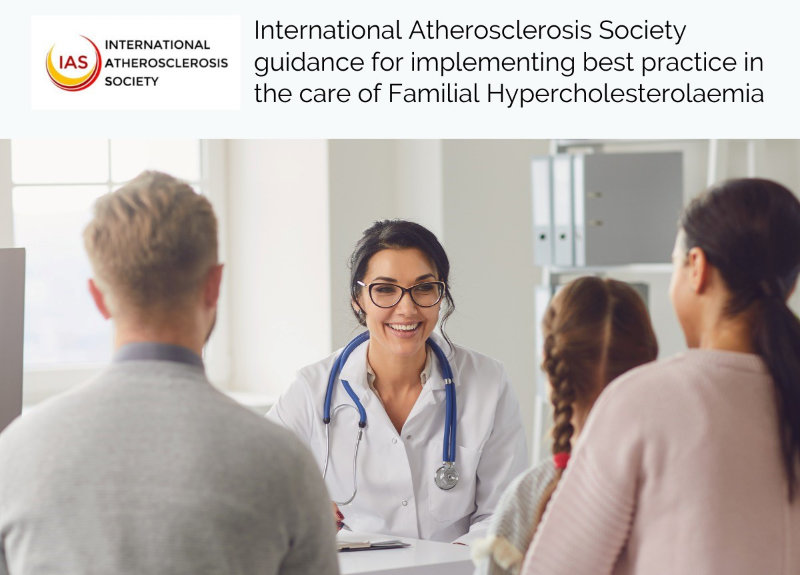
Medical experts and patient advocates recommend screening, genetic testing and patient-centred treatment plans for genetic form of high cholesterol known as familial hypercholesterolaemia (FH).
Amsterdam, July 20, 2023 -- New guidance from medical experts at the International Atherosclerosis Society, in collaboration with patient advocates, presents new clinical and implementation strategies for treating the 35 million people worldwide living with familial hypercholesterolaemia, a genetic form of high cholesterol commonly known as FH. The guidance, published on June 15 in the top-rated scientific journal Nature Reviews Cardiology, includes strategies for addressing FH, including its severe form homozygous FH (HoFH).
Screening achieves early detection of FH, and applying a person-centred, multidisciplinary approach can help clinicians and patients manage FH. Heart disease leading to serious cases of FH can start early in life, even in childhood, so integrating different screening strategies and training all health care providers is essential. Identification and management of FH can ultimately prevent cardiovascular disease onset and help drive population-based cardiovascular health.
Genetic testing should be made universally available, and practices should be aligned, standardized, and integrated with both local legislation and policy and the broader health care community. Genetic testing is the most accurate way to diagnose FH, but such practices are currently expensive and not readily available. This guidance recommends increasing awareness of counselling, genomics and screening of relatives for FH.
Treatment plans should be patient-centred, focus on risk-reduction practices, improve quality of life and start as early as possible. They should also include guideline-directed strategies from peers and the wider health care community. Clinical trials and studies show that managing lifestyle and beginning cholesterol-lowering treatment at an early age maximally reduces the burden of FH.
To increase availability of lipoprotein apheresis, this guidance recommends centralized units, communication channels and a wider community within which to share expertise on apheresis. Lipoprotein apheresis by absorption is safe and effective, but it is not universally available or used. Infrastructure to make apheresis more widely available is required to treat patients with HoFH, the severest and less common form of FH.
The International Atherosclerosis Society's initiative to update the procedures and model of care for FH is in response to an international need for more comprehensive treatment strategies. It is also one of very few guidance in the space of FH, which proactively engages patients and patient advocates to reflects their needs and recommendations.
"FH, a relatively common condition, is widely underdiagnosed and undertreated. To address this gap, IAS assembled an expert team to generate guidance for practical implementation of best practices in the care of those with FH. This document deals with the scope of the problem, the detection of FH, practical and evidence–based management recommendations, and strategies for the implementation of care. It aims to be of general use to the broader cardiovascular and primary care community. This publication represents an international cooperation under the auspices of the IAS, and advances our mission of reducing atherosclerotic cardiovascular disease worldwide."
"This is a landmark publication for people living with FH and those providing medical care for them. It brings together world medical experts and patient advocates to produce a very comprehensive document, which is person-centric, with patient/person voice embedded in the content and in the implementation strategies. It goes beyond being a medical guideline, however, as it serves as credible support for advocacy and policy influencing activities which will help us all move from cardiovascular disease towards cardiovascular health in people with FH and HoFH."
"FH, which is frequent and untreated, is associated with very high risk of atherosclerosis and coronary artery disease. It should be diagnosed and managed from an early age. This IAS document provides the best evidence-informed clinical and implementation strategies for the cost-effective care of all patients with the condition. The guidance was developed by a team of leading experts and aims to achieve the greatest good for the greatest number of people with FH across all regions of the world."
Statement from Gerald F. Watts, MD, Co-chair and corresponding author of the guidance:
"FH is a preventable cause of premature disease and death due to coronary heart disease, with substantial effects on public health. This IAS guidance addresses major gaps in the care of FH and uniquely employs implementation science to better translate evidence into practice. This should result in maximal benefit for people and communities. Because of differences among countries, a contextual approach will be required for implementing the recommendations."
To make the best use of this new guidance, there must be a push towards adapting and integrating these practices into health care systems, policies and wider communities built on advocacy, and peer-related support.
Read the IAS guidance for implementing best practice in the care of FH here.
The International Atherosclerosis Society is a federation of member organizations worldwide whose basic missions are to promote the scientific understanding of the etiology, prevention and treatment of atherosclerosis. The IAS exists to coordinate the exchange of scientific information among the constituent societies, to foster research into the development of atherosclerosis, and to help translate this knowledge into improving the effectiveness of programs designed to prevent and treat this disease.